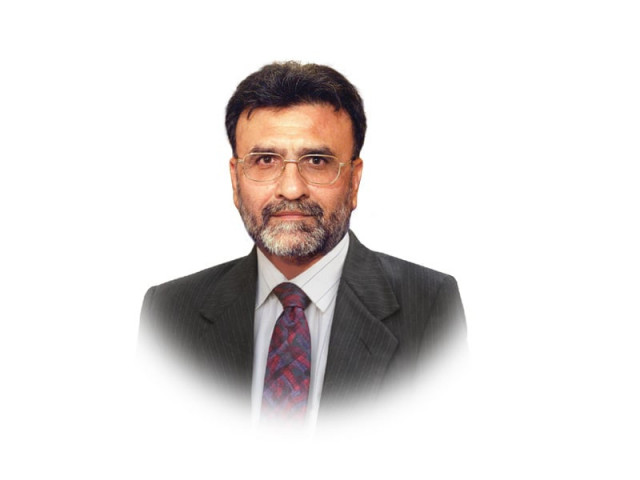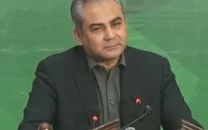Session or no session, PPP’s eyes Swiss letter
PPP legislators were losing their sleep over far more crucial question: writing ‘the letter’ to the Swiss government.

Scanning through the agenda put before the National Assembly session on Wednesday, one failed to discern any of the above-mentioned objectives.
After rushing through a non-engaging question hour, our representatives were supposed to participate in free-for-all speechmaking on issues related to load-shedding and law and order, which have been persisting for years.
On the eve of summoning the ongoing session, the Pakistan Peoples Party (PPP)-led coalition had tried to make us believe as though both the houses of parliament would pass a comprehensive law to effectively prosecute terrorists, ruthlessly employing all possible tools abundantly available in this age of digital communication.
Since ending the operation in Swat in the summer of 2009, the khakis had been demanding such a law to ensure the speedy and effective prosecution of thousands of alleged terrorists caught by them. Of late, the superior judiciary has also begun feeling uncomfortable with PPP-sponsored media stories and spins that accuse judges of “letting the terrorist go scot-free.”
Although widely projected in the media, the so-called ‘Fair Trial Act’ was only presented before the federal cabinet Wednesday morning. After its clearance from there, it now has to go to the law ministry for appropriate vetting. We are yet not sure whether the draft coming from the law ministry will be adopted without any opposition in parliament.
Already, weighty voices from within the PPP, such as Raza Rabbani, have been forcefully rejecting the idea of providing some legal cover to phone-tapping by various intelligence agencies.
With the clear idea of assuaging potential opponents such as him, the interior minister was heard telling some TV networks on Wednesday that sleuths would require courts’ permission for wire tapping. Doing so, he disregarded the reality that law enforcing agencies, both in khaki and otherwise, were asking for a backdated approval of the material they claim to have gathered after months of digitally shadowing hundreds of suspects.
Yet, instead of pondering over the delicate nuances of law-making, PPP legislators were losing their sleep over a far more crucial question: writing ‘the letter’ to the Swiss government. Sure, they succeeded in getting Prime Minister Raja Pervaiz Ashraf elected after his predecessor’s humiliating ejection from the prime minister’s office – but Raja, too, has been asked to appear before the Supreme Court on September 18, with an unambiguous direction to explain how he plans to proceed on the same order.
Mainstream PPP legislators are pathetically clueless on this count. They feel even more confused after reading and watching media stories that have been suggesting that the law minister had found a win-win way out. Some of them told the prime minister by various means that they felt betrayed for not being kept in the loop on this issue.
While sharing their heartbreak with Raja, some of them even named a few weighty journalists, who, they claimed, were enjoying around-the-clock access to Farooq Naek.
To pacify this lot, the prime minister hosted a working lunch on Tuesday for party legislators. The law minister cautiously began briefing participants, dropping hints that the government was now moving towards ‘the middle ground’ in the context of writing a letter to the Swiss government.
Some die-hard jiyalas did not let him fly, however. Hawks like Mumtaz Alam Gillani and Nadeem Afzal Chann bluntly asked the law minister how and why he felt so confident that the court would accommodate the win-win solution he had been peddling.
Naek miserably failed to spin a satisfying story. His desultory comments, rather, forced some legislators to vigorously recall the formative days of the PPP-led coalition after the election of 2008.
Naek was the most pampered and the one and only legal eagle of President Asif Ali Zardari those days, and he would firmly tell his colleagues that, as per the law, Dogar, the former chief justice, was ‘duly appointed’ and unless he completed his ‘term,’ Justice Iftikhar Muhammad Chaudhry could not be restored.
It, indeed, is a reality that Justice Iftikhar was restored to his office, only after the completion of Dogar’s term – but in the process, the PPP lost the support of Nawaz Sharif and appeared as the sole hurdle to the “restoration of independent judges.”
After finding details of the fierce discussion held at the lunch, one failed to fathom how Naek would sell his ‘line’ to the president and the prime minister.
Published in The Express Tribune, September 6th, 2012.



















COMMENTS
Comments are moderated and generally will be posted if they are on-topic and not abusive.
For more information, please see our Comments FAQ